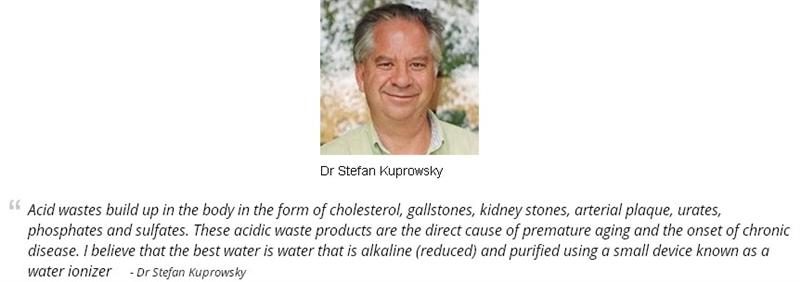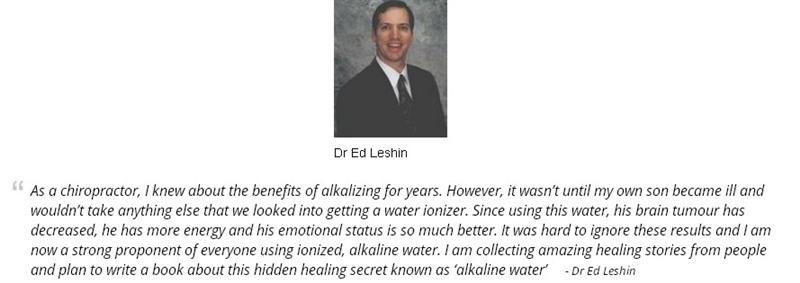Ionized Water and Professional Athletes
By Dr. Robert Burns, PhD / Dr. Susan Lark, MD
Competitive, elite athletes and sports trainers know that subtle changes in pH can have profound effects on the overall health, feeling of wellness, level of fatigue, pain, weight, ability to train and athletic performance. Muscles work best in a narrow range of Ph. At rest, muscle pH is about 6.9, while arterial blood is about 7.4.
When we exercise, the increased use of muscle glycogen for energy produces lactic acid, pyruvic acid, and CO2, which decreases muscle pH. The harder you exercise the quicker your muscles become acidic which leads to fatigue. Accumulation of acid also limits the production of ATP, the energy molecule, and disrupts enzyme activity that produces energy.
For example, the enzyme phosphofructokinase is the rate-limiting step in muscle use of glycogen. When muscle pH falls below 6.5 it stops working altogether. Acidity also reduces muscle power directly by inhibiting the contractile action of muscle fibers.
“Endurance and elite sports athletes should be concerned about maintaining a healthy pH balance,” says Robert Burns, PhD. He notes that lactic acid build-up or hydrogen ion excess is of most concern. As the body metabolizes food, acid waste is created which must be removed or neutralized through the lungs, kidneys (urine) and skin. “pH balance and acid buffering are crucial to human health and slowing the aging process,” he explains. Athletes, coaches and practitioners of holistic and traditional medicine are paying more attention to this area. “We may be able to buffer or slow the negative effects that acidosis has on athletes as well as the many disparate maladies that share acidosis as a common thread,” he concludes.
The use of alkaline water is proving to increase competitiveness and overall performance in world class athletes. A diet that supports alkalinity is also recommended by sports nutritionists. Consuming alkaline water will reduce the accumulation of acidity in exercising muscles, improving workout intensity and recovery time. Former Denver Bronco, Bill Romanowski, was introduced to the power of ‘ionized’ water late in his career doing anything legal to maintain his competitive edge.
Competitive bodybuilder, Wade McNutt, credits the use of alkaline water for motivating him to come out of retirement. He says he has increased his training volume by 2.5 times with decreased recovery time and no muscle soreness. In his opinion, all sports teams should be drinking alkaline water because it will reduce injuries and allow for more efficient training.
In her book, The Chemistry of Success: Secrets of Peak Performance, Susan Lark, MD, talks about the role of acid/alkaline balance in peak performance and health. The following is her assessment of alkaline water:
“The benefits of the alkaline water created through electrolysis far exceed just its ability to gently raise the pH of the cells and tissues of the body and to neutralize acids. Because the alkaline water has gained a significant number of free electrons through the electrolysis process, it is able to donate these electrons to active oxygen free radicals in the body, thereby becoming a super antioxidant. By donating its excess free electrons, alkaline water is able to block the oxidation of normal tissue by free oxygen radicals.”
She continues by noting that another significant benefit of the electrolysis process is that the cluster size of the alkaline water is reduced by about 50% from the cluster size of tap water. “This allows ionized alkaline water to be much more readily absorbed by the body, thereby increasing the water’s hydrating ability and its ability to carry its negative ions and alkalizing effect to all the cells and tissues of the body.”
“If you are overly acidic an alkaline water device can provide a safe, gentle and effective way of restoring the pH balance of all the cells in your body as well as providing excess free electrons to act as super antioxidants,” Lark recommends.
Most people, including most athletes, do not consume enough alkaline rich foods, such as nuts, fruits, and vegetables. Instead their diets contain high amounts of acid forming foods, such as meat, fish, poultry, eggs and dairy. Because of this dietary imbalance, they may be at risk for increased acidosis that affects overall health and sports performance. Since proper hydration is also a key factor in preventing exercise fatigue, consuming alkaline water before, during and after exercise can help.

































